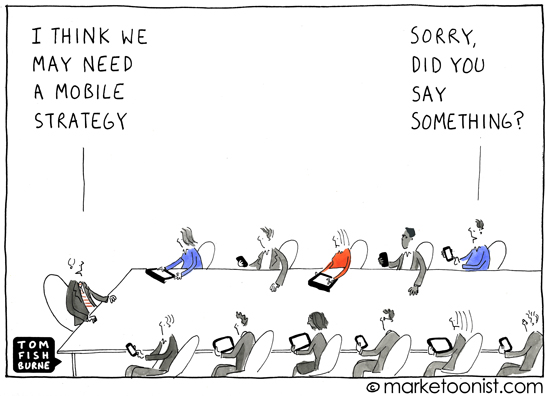Put down your iPhone for a second, we're strategizing here.
A prediction for 2012: There will be about 17,294 '2012 Predictions' blog posts and newsletter articles stressing the importance of mobile technology for workforce tools, marketing, branding, recruiting, gaming, training - you name it, chances are you will be warned that you'd better have a 'mobile strategy' for all of it.
And you better. So get on that now. And as the funny and apt cartoon from the Marketoonist reminds us, you might need to put down your toys for a few minutes while you sort that out.
Jokes aside, the correct approaches to mobile technology and the mobile-enablement of current workplace technologies probably present a set of challenges, (and certainly opportunities), unlike previous or last generation problems that needed to be solved.
Needed to make sure the time and attendance system met your needs? Well, since everyone used to report to the office, the process of badging or punching in was fairly simple. As long as the data was passed to the payroll system, you had most of your problem licked.
Today that same system and process might need to be supported on 5 mobile operating systems, on dozens of devices, and multiple languages. Not so simple for sure. And that doesn't even begin to touch upon the issues surrounding preferred usage styles and form factors on these devices, and just what workplace functionality should be mobile-enabled and what perhaps should not.
All in all, you will be told that in 2012 mobile will get even more important for getting work done, for engaging with employees, candidates, and customers; and for competing globally.
What you won't be told is that you'll need to sign off of Angry Birds and Flipboard for a few minutes to sort it out.
Wait, maybe we can build an Angry Birds extension that equates punching in at work to smashing a few pigs?

 Steve
Steve

Reader Comments (7)
Great post as usual, Steve! And be assured that I'll forward the Angry Birds extension idea to our product team. :)
On a serious note - you've touched on a trend that I think will fundamentally shifted the way organizations select and implement applications in the enterprise. In an era dominated by desktop PCs, wall terminals (aka time clocks), and laptops (although many companies have a few renegade MacBook users) - the type(s) of devices in use are selected, purchased, and maintained by the employer. That mindset has held on through a span of BlackBerry proliferation, but seems inexorably in decline. A growing number of employees now expect that whatever smartphone they walk through the hiring office door with will be set up to access and manipulate business apps.
In the not-so-distant future, employers may be selecting applications that (practically speaking) need to be compatible with a dozen disparate devices to ensure that managers, telecommuters, and the like are truly adopting them. There will be a balancing act here - because employee choice can't outweigh business value in other areas (e.g. meeting your functional requirements) - but compatibility/flexibility/openness has rapidly emerged as primary business requirement for new systems.
And... make that 17,295 predictions. (You know us so well!)
Right on, Jonathan! I think you make some great points. Navigating the tricky and ever-changing mobile landscape will likely be a high priority for HR and IT leaders in 2012 and beyond. Thanks for sharing your thoughts here.
Nice post….thanks for sharing.. very useful for me i will bookmark this for my future needed. thanks for a great source..
I completely agree with you. I have no point to raise in against of what you have said I think you explain the whole situation very well.
Good article and great site.Thank’s for sharing..!
Your article definitely worth looking through.. I must personally appreciate the time you devote to create this marvelous post. I can't wait for new updates on your site.
The ISC CCSP Exam Questions Answers assesses your knowledge and skills in cloud security. It covers key areas such as cloud architecture, governance, risk management, and compliance. To prepare effectively, focus on understanding cloud service models (IaaS, PaaS, SaaS), security controls, and the legal aspects of cloud usage. Practice with sample questions to familiarize yourself with the exam format and question styles. Key topics include data security, identity and access management, and incident response. Utilize study materials, online courses, and practice exams to reinforce your understanding and build confidence before the test.